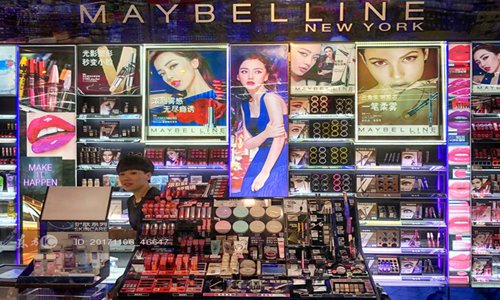Consumers eyeing other brands amid trade tension
US cosmetics and skincare brands are risking losing market share in China as some Chinese consumers are considering shifting to French and Japanese brands amid the ongoing trade tension between China and the US.

Maybelline makeup on sale at a supermarket in Shanghai in November 2017 (Photo: IC)
A Beijing-based female consumer surnamed Zhang, who has used an eye cream from US skincare brand Kiehl's for about three years, said that she's now considering other products.
"The US has been stirring up trouble with China, which makes me a little disgusted with US brands," she told the Global Times on Monday, adding that she might shift to cosmetics brands from Japan or France in the future.
Another female consumer in Shanghai named Wu Shasha said that she would consider giving up US cosmetics and skincare brands in the future if their prices rise by more than 10 percent.
The US and China are locked in a trade dispute after the administration of President Donald Trump imposed tariffs on $34 billion of Chinese imports, which took effect on July 6. China's foreign ministry said the same day that tit-for-tat duties on US goods took effect straight away after Washington's tariff kicked in.
"So far, cosmetics and skincare products are not yet on China's tariff increase list for US goods. Also, there are some US cosmetics and skincare brands that are manufactured and sold in China [so they won't be affected by any tariff punishment]. In this sense, US cosmetics and skincare products are less threatened by the trade dispute than other items like planes or farming products," Chen Min, editor-in-chief of cosmetics industry website C2CC, told the Global Times on Monday.
"Sales of US cosmetics are not slumping in China yet," Chen said.
A PR representative from French cosmetics company L'Oreal, which also owns US cosmetics brands like Maybelline, said the company wouldn't comment on the Sino-US trade dispute issue, but the company's overall business in China is stable and improving currently.
But experts said that although the effects of the trade dispute have not become obvious yet, there is still a threat hovering over US goods.
A US cosmetics and skincare daigou, who buys products abroad on behalf of domestic consumers, told the Global Times on condition of anonymity on Monday that the recent depreciation of the yuan, which is a side effect of the Sino-US trade dispute, has started to eat into her profits.
She said that she has not changed the products' price yet, but in the future she might be forced to do so if the yuan continues to weaken or if there's any tax increase on her products.
Chen Yuefeng, founder of retail news website lingshouke.cn, said that it's an "option" for the Chinese government to raise tariffs on US cosmetics and skincare products if the trade dispute continues. "If that happens, it will definitely affect US cosmetics firms' sales in China," he said.
Chen Min of C2CC said that if US cosmetics products become more expensive, Chinese consumers can easily find other options. "But for US companies, if they lose the Chinese consumers, can they get them back?"
Data sent by international market consultancy Euromonitor International to the Global Times on Monday showed that in 2017, Max Factor, a US makeup brand, accounted for 3.4 percent of China's cosmetics market in sales revenues, up from 2.8 percent in 2016, while Estee Lauder accounted for 2.5 percent of China's skincare market in 2017, up from 2 percent in 2016.
(Source:Global Times)


